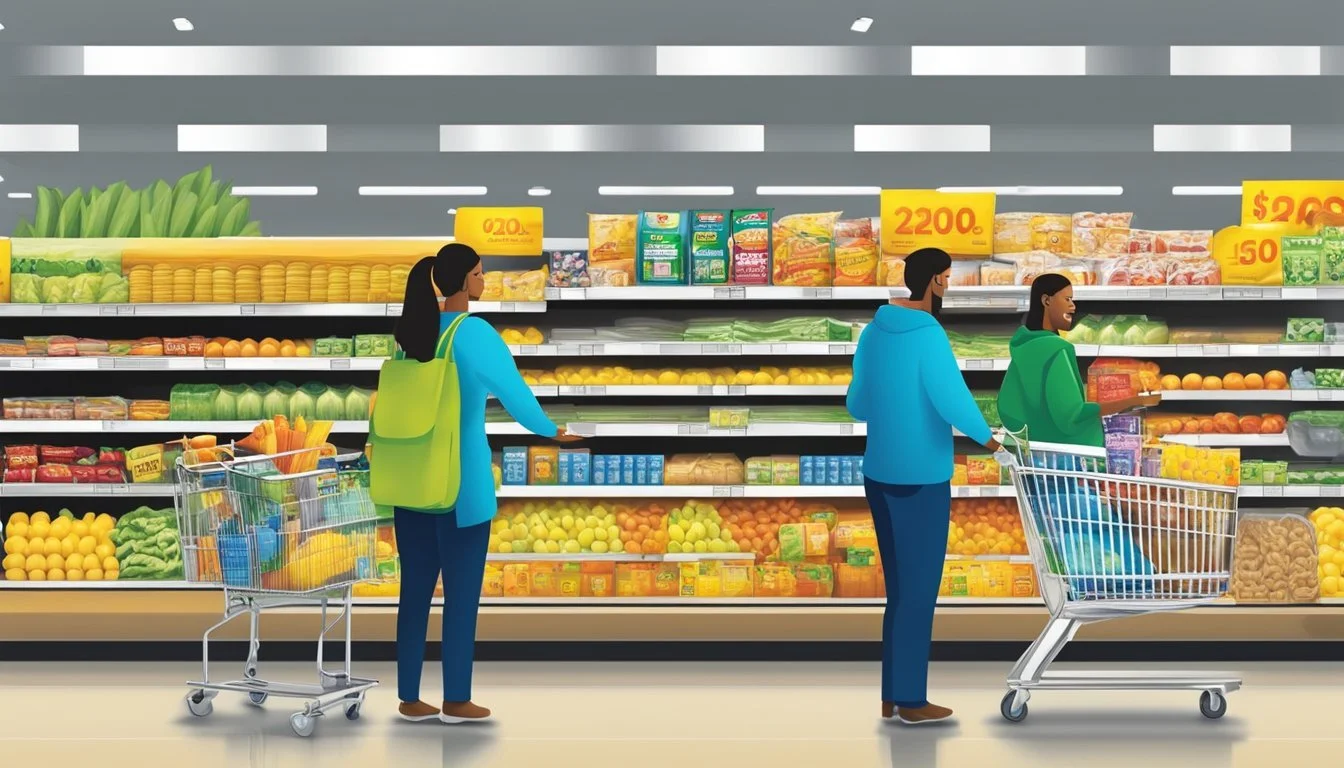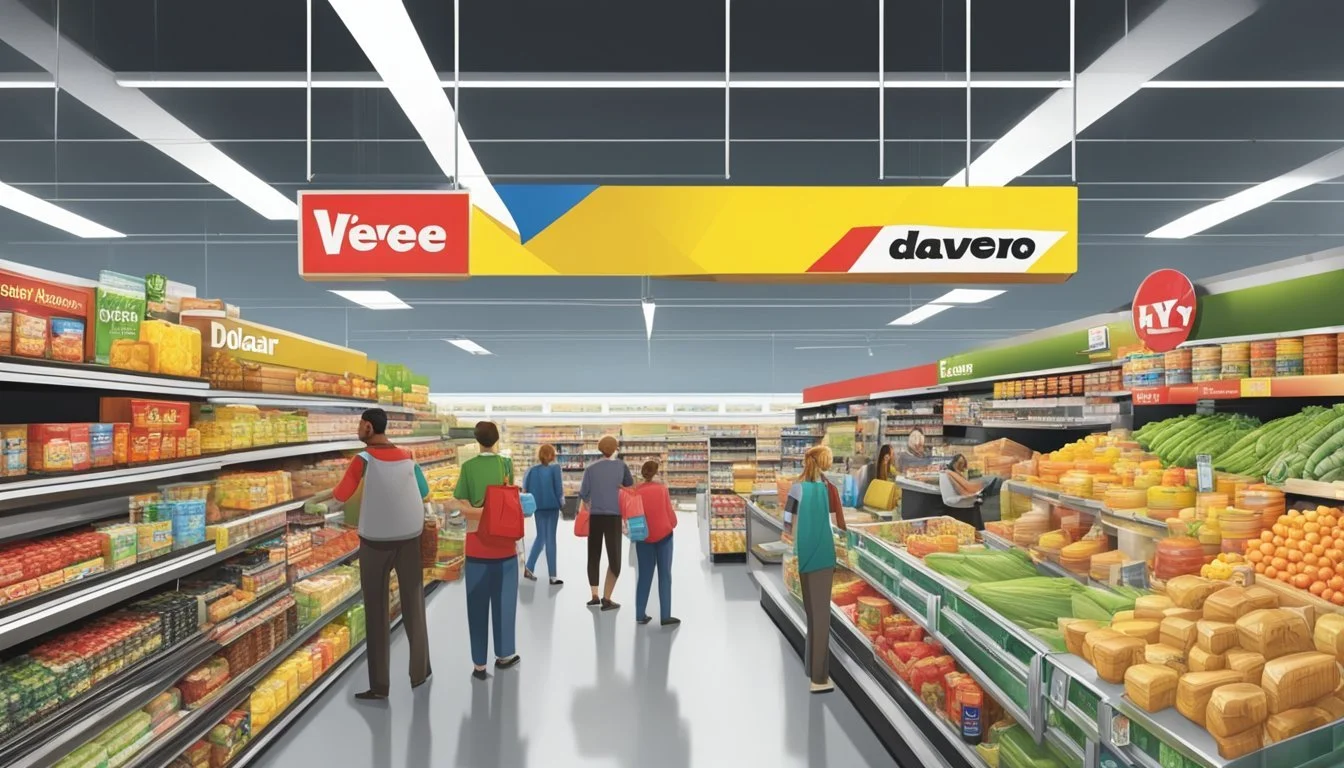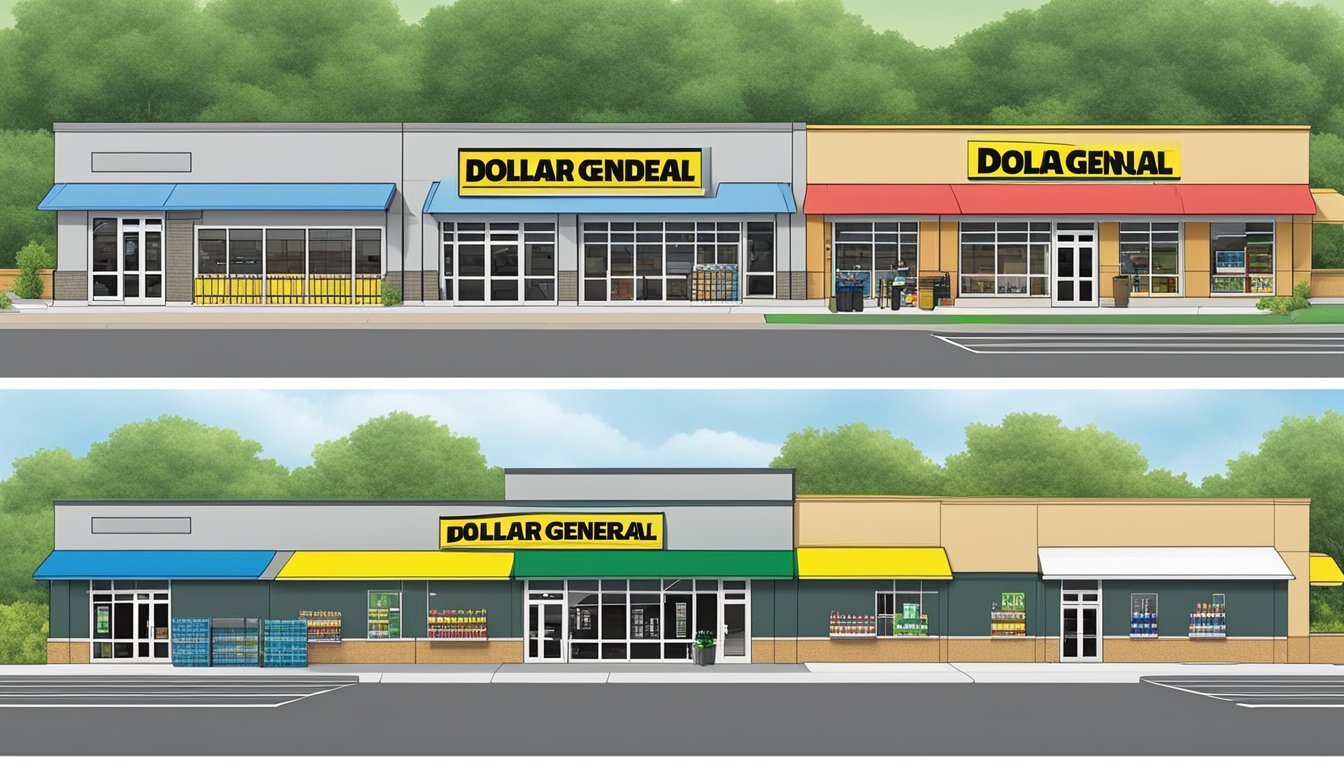Dollar General vs Hy-Vee
A Comparative Analysis of Price, Selection, and Quality
Dollar General and Hy-Vee are two prominent retailers in the American grocery landscape, each with its own unique approach to serving customers. Dollar General focuses on offering everyday essentials at discounted prices, while Hy-Vee operates as a full-service supermarket chain with a wider range of products and services.
Dollar General generally offers lower prices on many items compared to Hy-Vee, but Hy-Vee provides a more comprehensive grocery shopping experience with fresher produce, a larger selection, and additional amenities. This key difference impacts the shopping preferences of various consumer groups, with budget-conscious shoppers often gravitating towards Dollar General and those seeking a one-stop shop for all their grocery needs preferring Hy-Vee.
The choice between these two stores ultimately depends on individual priorities. Factors such as product quality, store location, pricing, and available services all play a role in determining which retailer better suits a shopper's needs. By examining these aspects, consumers can make informed decisions about where to spend their grocery dollars.
Company Overview
Dollar General and Hy-Vee are two prominent grocery chains in America with distinct market presences and operational strategies. Both retailers have established themselves as significant players in the grocery industry, albeit with different regional focuses and store formats.
Dollar General's Market Presence
Dollar General operates over 18,000 stores across 47 states in the United States. The company primarily focuses on small-format stores in rural and suburban areas. Dollar General's strategy revolves around offering everyday low prices on a wide range of household essentials, including groceries, cleaning supplies, and health products.
Dollar General stores are typically smaller than traditional supermarkets, averaging around 7,400 square feet. This compact format allows the chain to operate efficiently in smaller communities where larger grocers may not be economically viable.
The company's rapid expansion has made it one of the fastest-growing retailers in America. Dollar General's success stems from its ability to serve areas often overlooked by larger supermarket chains.
Hy-Vee's Regional Influence
Hy-Vee is a regional grocery chain with a strong presence in the Midwest. The company operates over 285 stores across eight states: Iowa, Illinois, Kansas, Minnesota, Missouri, Nebraska, South Dakota, and Wisconsin.
Founded in 1930, Hy-Vee has grown from a small general store to a significant player in the Midwestern grocery market. The company is employee-owned, which contributes to its reputation for exceptional customer service and community involvement.
Hy-Vee stores are typically larger than Dollar General locations, offering a full-service supermarket experience. Many Hy-Vee stores feature in-store dining options, pharmacies, and specialty departments like floral and wine & spirits.
The chain has also expanded into alternative store formats, including convenience stores and dollar store concepts, to serve diverse customer needs in its operating regions.
Price Comparison
Dollar General and Hy-Vee offer different pricing strategies and value propositions for shoppers. Their approaches to affordability and product quality impact overall consumer value.
Affordability and Low Prices
Dollar General focuses on providing low prices across its product range. The store's smaller format and limited selection allow for reduced overhead costs, which translates to cheaper prices for customers. Many items are priced at $1 or less, making it an attractive option for budget-conscious shoppers.
Hy-Vee, while not primarily known as a discount retailer, offers competitive prices on many items. The store runs weekly sales and promotions to provide additional savings opportunities. Hy-Vee's larger format allows for a wider product selection, but this can result in slightly higher prices on some items compared to Dollar General.
Quality and Value for Money
Dollar General emphasizes affordability, but product quality can vary. The store offers a mix of name-brand and private-label items, with the latter often available at lower price points. Some shoppers find good value in Dollar General's store brands, while others prefer to spend more for perceived higher quality.
Hy-Vee generally maintains a reputation for higher quality products across its departments. The store's private-label offerings often compete with national brands in terms of quality while providing cost savings. Hy-Vee's fresh produce, meat, and bakery departments are typically well-regarded, potentially offering better value for shoppers prioritizing product quality alongside price considerations.
Product Selection
Dollar General and Hy-Vee offer distinct product selections tailored to their target markets. Their approaches to store brands and product diversity shape the shopping experience for customers.
Store Brand Offerings
Dollar General's store brand, DG, focuses on affordable generic staples. It covers basic food items, household goods, and personal care products. DG brands include Clover Valley for food and Smart & Simple for household items. These products aim to provide value at lower price points.
Hy-Vee's store brand lineup is more extensive. It includes Hy-Vee branded products across various categories, from groceries to health and beauty. Hy-Vee also offers premium store brands like Gustare Vita for Italian foods and Good Graces for gluten-free options. These store brands often compete with national brands in quality and taste.
Diversity in Products and Brands
Dollar General's product selection is more limited. It emphasizes non-perishable foods, snacks, and basic household items. Fresh produce and meat options are minimal. The store carries some national brands but focuses on budget-friendly alternatives.
Hy-Vee provides a wider range of products and brands. Its stores feature extensive fresh produce sections with organic options. Hy-Vee's meat department offers high-quality cuts and specialty items. The retailer stocks a variety of national brands alongside its store brands. Hy-Vee also carries more specialty and gourmet products, catering to diverse dietary needs and preferences.
Consumer Experience
Dollar General and Hy-Vee offer distinct shopping experiences for customers. Their approaches to store layout, customer service, and checkout processes differ significantly.
Shopping Environment and Convenience
Dollar General stores are typically smaller, with a no-frills layout focused on efficiency. Aisles are narrow but well-organized, making it easy to find essential items quickly. The compact size of Dollar General locations allows for placement in rural areas and urban neighborhoods, increasing accessibility for many shoppers.
Hy-Vee supermarkets, in contrast, provide a more spacious and upscale environment. Wide aisles, clearly labeled departments, and a greater variety of products create a more leisurely shopping atmosphere. Hy-Vee often includes additional amenities like in-store pharmacies, dining areas, and even clothing sections in some locations.
Both chains offer convenience stores, with Hy-Vee's versions generally being larger and offering more fresh food options. Hy-Vee also provides grocery delivery options, catering to customers who prefer shopping from home.
Customer Service and Checkout Experience
Dollar General emphasizes quick transactions, with a limited number of checkout lanes and self-service options in some stores. Staff numbers are kept minimal to maintain low prices, which can result in longer wait times during busy periods.
Hy-Vee places a stronger emphasis on customer service. Stores typically have more staff members available to assist shoppers, answer questions, and provide product recommendations. Checkout areas in Hy-Vee stores often feature multiple lanes and self-checkout options to accommodate various customer preferences.
Hy-Vee's commitment to service extends to its online presence, with robust digital tools for ordering groceries and managing prescriptions. Dollar General's online services are more limited but still allow for basic product browsing and location finding.
Additional Services
Dollar General and Hy-Vee offer distinct additional services beyond basic grocery shopping. These extras can significantly impact the overall shopping experience and customer convenience.
Pharmacy and Health Options
Hy-Vee features full-service pharmacies in many locations, providing prescription fills, immunizations, and health screenings. Their HealthMarket sections stock vitamins, supplements, and natural health products. Pharmacists offer medication management and counseling services.
Dollar General, in contrast, does not typically have pharmacies. Some stores carry over-the-counter medications and basic health supplies, but the selection is limited compared to Hy-Vee.
Preparing and Ready-to-Eat Foods
Hy-Vee excels in prepared food options. Many stores have extensive delis offering hot meals, sandwiches, and salads. Their bakeries produce fresh bread, cakes, and pastries daily. Some locations feature sushi bars, pizzerias, and even sit-down restaurants.
Seafood counters at Hy-Vee provide fresh fish and prepared seafood dishes. The stores often have dedicated wine and beer sections with knowledgeable staff to assist customers.
Dollar General's prepared food offerings are minimal. Some stores have a small selection of pre-packaged sandwiches or snacks, but they lack the variety and freshness of Hy-Vee's options.
Store Formats and Accessibility
Dollar General and Hy-Vee offer different store formats to serve various customer needs. Their locations and accessibility also play a crucial role in attracting shoppers, especially families.
Conventional vs Discount Store Formats
Dollar General focuses on smaller discount stores, typically 7,000-10,000 square feet. These stores carry a limited selection of groceries, household items, and basic necessities at low prices. Dollar General has also introduced larger DG Market formats, around 16,000 square feet, to include more fresh produce and meat.
Hy-Vee operates primarily full-service supermarkets, averaging 80,000 square feet. These stores offer a wide range of groceries, fresh produce, bakery items, and prepared foods. Hy-Vee has also developed alternative formats:
Dollar Fresh: A discount banner competing with dollar stores
Hy-Vee Fast & Fresh: Convenience store format
Wine & Spirits: Standalone alcohol outlets
Location and Access for Families
Dollar General targets rural and suburban areas, often serving communities with limited retail options. Their smaller stores can fit into locations that larger supermarkets cannot, providing essential goods to underserved areas.
Hy-Vee stores are predominantly located in midwestern states, with a mix of urban and suburban locations. Their larger supermarkets offer one-stop shopping for families, including pharmacies and in-store dining options.
Both chains prioritize convenient locations for families:
Dollar General: Numerous small stores within short driving distance
Hy-Vee: Fewer locations, but comprehensive offerings for family shopping trips
Loyalty Programs and Promotions
Dollar General and Hy-Vee offer distinct loyalty programs and promotional strategies to attract and retain customers. These programs provide various ways for shoppers to save money through discounts, coupons, and exclusive offers.
Membership Benefits and Discounts
Dollar General's DG Digital Coupons program allows customers to load digital coupons onto their account for use at checkout. Members can access exclusive discounts and personalized offers based on their shopping habits.
Hy-Vee's Fuel Saver + Perks program is more comprehensive. It offers fuel discounts, digital coupons, and personalized deals. Members earn points on purchases, which can be redeemed for fuel savings or grocery discounts.
Hy-Vee also provides a tiered loyalty system called Boost. The free tier offers 1 point per dollar spent, while paid tiers ($59 and $99 annually) include additional benefits like free delivery and savings on specialty brands.
Coupons and Regular Promotions
Dollar General frequently offers $5 off $25 purchase coupons, typically available on Saturdays. They also run weekly ads with discounts on various items throughout the store.
Hy-Vee provides digital coupons through their app and website. They offer weekly ads with sales and promotions, often including buy-one-get-one deals and discounts on popular items.
Both stores have senior discount days. Dollar General offers a 10% discount for seniors on specific days, which vary by location. Hy-Vee provides a 10% discount for customers 55 and older on Wednesdays or Thursdays at select stores.
Hy-Vee's promotions tend to be more diverse, including fuel savings and personalized offers. Dollar General focuses on consistent low prices and simple discount structures.
Market Position and Competitiveness
Dollar General and Hy-Vee occupy distinct positions in the grocery retail landscape. Each chain has its own strengths and strategies for competing in a crowded market.
Comparison to Other Grocery Stores
Dollar General primarily competes with discount retailers like Family Dollar and Dollar Tree. It offers lower prices than traditional supermarkets, appealing to budget-conscious shoppers. The chain's smaller store format allows it to operate in rural areas where larger grocers may not be viable.
Hy-Vee, on the other hand, positions itself as a full-service supermarket. It competes directly with regional chains like Meijer and national players such as Kroger and Walmart. Hy-Vee's focus on fresh produce, in-store dining, and customer service sets it apart from discounters.
Both chains face competition from rapidly expanding discounters like Aldi and Lidl. These European imports have disrupted the U.S. grocery market with their low prices and efficient operations.
Future Prospects and Expansion
Dollar General continues to grow rapidly, opening new stores at a breakneck pace. The chain sees opportunity in underserved rural markets and urban food deserts. Its low-cost model and focus on essential items position it well for economic downturns.
Hy-Vee is pursuing a more diversified growth strategy. The company is expanding its footprint in the Midwest while also experimenting with new store formats. These include convenience stores, dollar stores, and even standalone liquor outlets.
Both chains are investing in e-commerce and delivery services to compete with Amazon and Walmart. Dollar General's DG Pickup and Hy-Vee's Aisles Online aim to offer convenience to time-strapped shoppers.
Company Ethos and Consumer Perception
Dollar General and Hy-Vee have distinct brand identities and approaches to corporate responsibility that shape how consumers view them. These factors play a significant role in customers' shopping decisions and loyalty.
Brand Reputation and Trust
Dollar General has built its reputation on affordability and convenience. The company targets rural and low-income areas, offering essential goods at low prices. This focus has earned Dollar General trust among budget-conscious shoppers.
Hy-Vee, in contrast, emphasizes quality and customer service. The regional chain has cultivated a strong local presence in the Midwest. Hy-Vee's employee-owned structure contributes to its reputation for attentive service.
BrandSpark International surveys consistently rank Hy-Vee highly for trust and customer satisfaction. Dollar General receives lower ratings in these areas but scores well for perceived value.
Sustainability and Corporate Responsibility
Hy-Vee has made significant strides in sustainability efforts. The company has implemented energy-efficient store designs, increased recycling programs, and expanded its offerings of local and organic products.
Dollar General's sustainability initiatives are less prominent. The company has focused on reducing energy consumption in stores and distribution centers. However, its low-cost model has faced criticism for potential environmental impacts.
Both retailers engage in community outreach. Hy-Vee is known for its local partnerships and food bank donations. Dollar General supports literacy programs and disaster relief efforts.
Consumer perception of corporate responsibility tends to favor Hy-Vee. The company's more visible sustainability efforts and community involvement contribute to a positive image among environmentally conscious shoppers.








